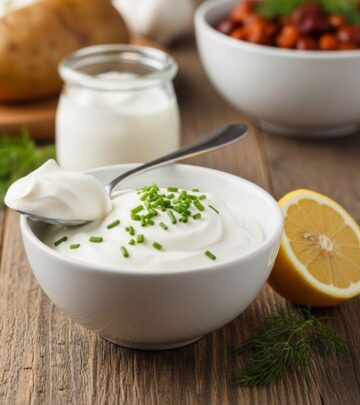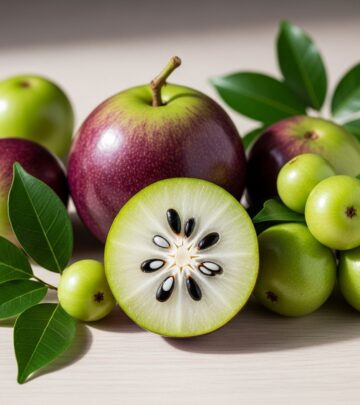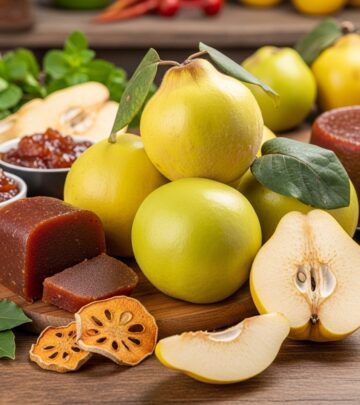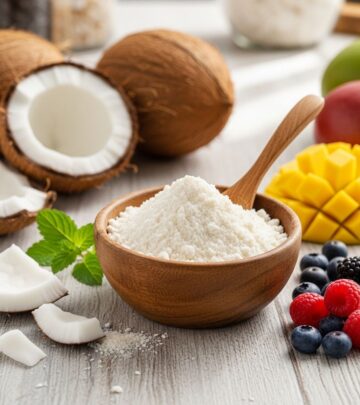12 Proven Health Benefits Of Cloves And How To Use Them
An aromatic remedy for digestion support, inflammation relief, and improved oral care.
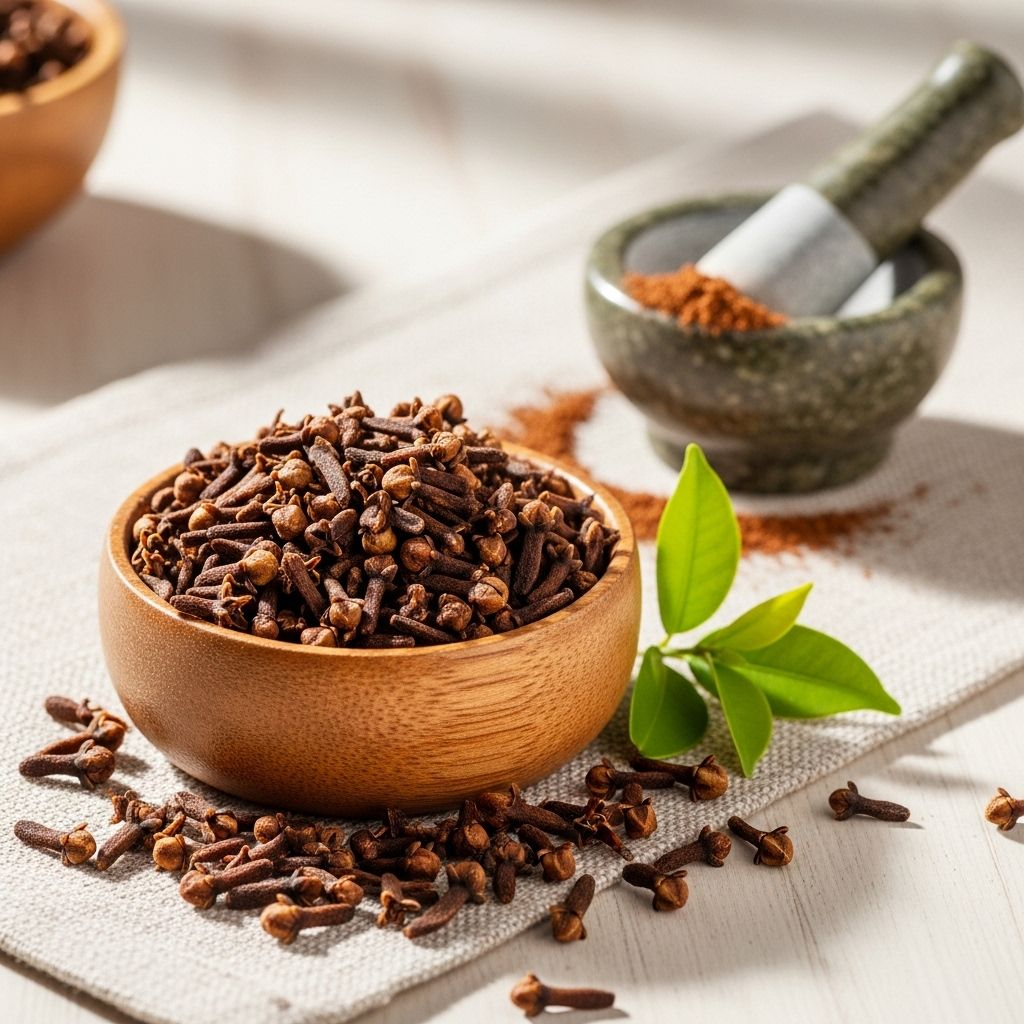
Cloves, the aromatic flower buds of the Syzygium aromaticum tree, have been celebrated throughout history for both their distinct flavor and remarkable medicinal properties. Native to Indonesia and widely used across cuisines and healing traditions, cloves offer a host of science-backed health benefits. From fighting inflammation to aiding digestion, their potential goes far beyond the kitchen.
What Are Cloves?
Cloves are small, nail-shaped spice buds harvested from the evergreen clove tree. Used whole or ground, they impart a warm, sweet, and slightly peppery flavor to both sweet and savory dishes. Beyond the kitchen, cloves are popular in traditional Chinese, Ayurvedic, and Western herbal medicine.
| Component | Notable Nutrients |
|---|---|
| Vitamins | Vitamin K, Vitamin C |
| Minerals | Manganese, Calcium, Magnesium, Potassium |
| Active Compounds | Eugenol, Flavonoids, Beta carotene, Tannins |
1. Packed With Essential Nutrients
Cloves are a rich source of manganese, an essential mineral that aids in bone formation, hormone production, and regulation of blood sugar. Just one teaspoon of ground cloves provides over 50% of the daily recommended intake of manganese. They also offer modest amounts of vitamin K, vitamin C, fiber, and other minerals.
2. Loaded With Powerful Antioxidants
Cloves contain a high concentration of antioxidants, compounds that protect cells from oxidative damage caused by free radicals. The main antioxidant in cloves is eugenol, which has been shown in studies to be even more effective than vitamin E at fighting oxidative stress. This effect may help lower risk for chronic diseases and slow cellular aging in the body.
3. Natural Anti-Inflammatory Effects
The eugenol and other bioactive compounds in cloves act as anti-inflammatories. Research suggests that consuming cloves may reduce bodily inflammation, which benefits conditions like arthritis or other inflammatory disorders. These effects can help relieve symptoms such as joint pain and swelling.
4. May Improve Liver Health
Early animal studies indicate that clove compounds, especially eugenol, help protect the liver against damage. These natural antioxidants may counteract the effects of free radicals and reduce inflammation associated with liver disease, including cirrhosis and fatty liver.
5. Promotes Healthy Digestion
Cloves have a long tradition in both herbal and scientific medicine for treating digestive issues. Consuming cloves or clove extracts may:
- Stimulate production of digestive enzymes
- Reduce flatulence, bloating, and gas
- Promote peristalsis (movement in the digestive tract)
- Alleviate nausea and stomach discomfort
Cloves’ fiber content also helps maintain regular bowel movements.
6. Soothes Dental Pain and Supports Oral Health
Historically, clove oil has been a mainstay for managing toothache and oral discomfort due to its natural anesthetic and antibacterial effects. Studies show that eugenol in clove oil may:
- Act as a local anesthetic to reduce pain
- Help slow plaque, gingivitis, and oral bacteria
- Potentially reduce dental erosion when applied to enamel
Mouth rinses containing clove extract have demonstrated effects similar to commercial mouthwashes in reducing plaque and inflammation.
7. Helps Regulate Blood Sugar
Emerging evidence shows cloves may benefit those with diabetes or blood sugar concerns. Animal studies indicate that compounds in cloves can help improve glucose tolerance, insulin secretion, and reduce insulin resistance. Adding cloves to the diet may provide gentle support for blood sugar management.
8. Protects Against Bacterial Infections
Cloves have antibacterial properties that make them beneficial against certain pathogens. Eugenol and related compounds can inhibit the growth of common bacteria linked to foodborne illnesses, dental caries, and infectious diseases. Clove oil has also shown effectiveness against fungal and viral microorganisms in lab settings.
9. May Lower Risk of Certain Cancers
Preliminary research indicates that clove extract and eugenol can help halt growth of some cancer cells and promote death of tumor cells (apoptosis), especially in skin and colon cancer cell lines. Antioxidant activity may also reduce overall cancer risk by limiting cellular DNA damage.
10. Supports Bone Health
Manganese in cloves is essential for forming strong bones and cartilage. Animal studies suggest that extracts of cloves improve bone density, support collagen synthesis, and protect against bone loss. This makes cloves potentially valuable for maintaining skeletal health as you age.
11. May Help Reduce Stomach Ulcers
Cloves can protect against and help heal ulcers in the stomach. Compounds in cloves thicken the protective mucus lining of the digestive tract, helping to prevent ulcers caused by acid, infection, or medication. Animal studies show improved ulcer healing and reduced ulcer formation when clove extracts are ingested.
12. May Help Ease Respiratory Symptoms
Cloves are traditionally used to relieve coughs, colds, and respiratory discomfort. Their expectorant and anti-inflammatory effects help reduce inflammation in the respiratory passages, soothe throat irritation, and loosen mucus. Clove oil may be included in rubs and steam inhalations for this reason.
Additional Potential Benefits
- Stress Relief: Some studies suggest cloves have anxiolytic and relaxing effects.
- May Reduce Risk of Urinary Tract Infections (UTIs): Traditional medicine uses cloves to fight infections including UTIs, though more human research is needed.
- Mild Analgesic: Eugenol acts as a gentle pain reliever for headaches and muscle aches.
How To Use Cloves In Your Daily Life
- Whole Cloves: Add to spice blends, mulled drinks, curries, broths, and desserts.
- Ground Cloves: Use in baked goods, spice mixes, or sprinkle on oatmeal/yogurt.
- Clove Oil: Diluted oil can be used topically (with caution) as a mouth rinse or for aroma.
Aim not to exceed 1 teaspoon (2 grams) of clove a day in food. When using clove oil, always dilute in a carrier oil and avoid direct, undiluted skin or mucous membrane contact.
Nutritional Profile (per 2g/1 tsp ground cloves)
| Nutrient | Amount |
|---|---|
| Manganese | 0.34 mg (55% DV) |
| Calories | 6.4 kcal |
| Vitamin K | 4% DV |
| Fiber | 1 g |
| Vitamin C | 1% DV |
Possible Risks And Precautions
Cloves are generally safe when consumed in food quantities, but concentrated clove oil or supplements should be used with caution. Potential risks include:
- Irritation or allergic reactions (especially with undiluted oil)
- Interactions with blood-thinning medications (cloves may enhance bleeding risk)
- Potential reduction of blood sugar to hypoglycemic levels in sensitive individuals
- Liver damage with excessive or prolonged use of concentrated extracts
Pediatric use, pregnancy, and high-dose supplementation should only be undertaken under the advice of a healthcare professional.
Frequently Asked Questions (FAQs)
Are cloves safe to consume every day?
Yes, moderate amounts (up to 1 teaspoon per day) are generally safe for most adults when used in food. Excess intake, particularly of clove oil, should be avoided unless supervised by a healthcare provider.
How can I use cloves for oral pain relief?
Apply a drop of diluted clove oil (mixed with a carrier oil) to the affected area with a cotton swab. Do not swallow large amounts and avoid prolonged contact.
Can cloves help control blood sugar?
Preliminary research suggests that cloves may help improve insulin function and blood sugar regulation. They should not replace prescribed diabetes medications but can be used as a supportive dietary addition.
Are there any people who should avoid cloves?
Individuals with bleeding disorders, on anticoagulant medications, or pregnant/nursing women should consult a doctor before increasing clove intake or using clove oil.
What are the best ways to store cloves?
Store whole or ground cloves in an airtight container away from light and heat. Whole cloves retain freshness longer than ground cloves.
Conclusion
From their potent antioxidants to traditional and modern health benefits, cloves are a valuable addition to the diet for most people. Consumed in moderation and used appropriately, this age-old spice supports oral health, digestion, immune function, and more. Enjoy cloves in your favorite dishes or as a natural remedy, but exercise caution with concentrated extracts and consult healthcare professionals as needed.
References
- https://www.webmd.com/diet/health-benefits-cloves
- https://www.medicinenet.com/the_11_health_benefits_of_eating_cloves_daily/article.htm
- https://www.medicalnewstoday.com/articles/320768
- https://www.healthline.com/nutrition/benefits-of-cloves
- https://pmc.ncbi.nlm.nih.gov/articles/PMC3819475/
- https://health.clevelandclinic.org/benefits-of-cloves
- https://pmc.ncbi.nlm.nih.gov/articles/PMC10755278/
Read full bio of Sneha Tete

